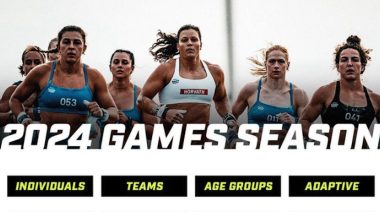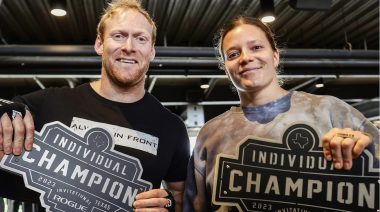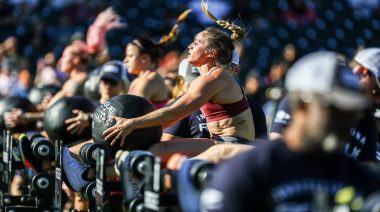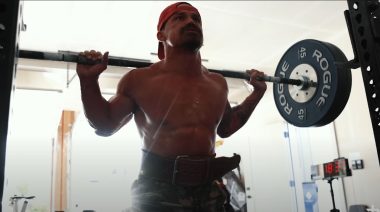Jamie Simmonds, 2019, the Third Fittest Woman on Earth, is an international CrossFit Games champion and ambassador for plant-based nutrition company Nuzest.
Formerly a gymnast and rugby player, Jamie made her name in the CrossFit competition scene in 2016 when she became a podium finisher with team CrossFit Yas.
Jamie Simmonds, 2019, the Third Fittest Woman on Earth, is an international CrossFit Games champion and ambassador for plant-based nutrition company Nuzest.
Formerly a gymnast and rugby player, Jamie made her name in the CrossFit competition scene in 2016 when she became a podium finisher with team CrossFit Yas.
Since then, she’s participated in the CrossFit Games five times, been a national champion for six years, and placed high on the podium multiple times; however, this year, Jamie ended the season early due to a shoulder injury received while training.
While in her recovery period, we asked her some questions regarding her journey.
Q: For those of us who don’t know you, who is Jamie Simmonds Greene?
A: I am Jamie Simmonds (used to be Greene). I’m from Dunedin, New Zealand, and I have competed in CrossFit at the CrossFit Games for the last six years (two years on a team and four years individually).
My best performances were 3rd place in 2016 on Team CrossFit Yas and 3rd place (individual) in 2019. I now live and train as a full-time athlete in Cardiff.
Q: What initially got you interested in CrossFit?
A: Initially, my mum bought me a six-week pass for Christmas to get me back into fitness. At the time, I was playing a lot of rugby but also drinking a lot of beer (haha).
I didn’t love it at first, mostly just the gymnastics. But as I got a little more committed, I loved it. I finished playing rugby after 12 or so years and started to compete in CrossFit.
Q: What challenges did you come across in getting to where you are today?
A: I faced so many challenges, but that’s all the fun of it. Without challenges, I wouldn’t be who I am today, and I wouldn’t have the skill set I have now.
I’ve had plenty of injuries: snapped Achilles, subluxed shoulder, and a dislocated shoulder… but a few surgeries later, I’ve learned lessons from all of them.
I also moved away from home to the Middle East, where I worked a lot. This had challenges of its own, but I’ve met so many people that have helped me get to where I am now.
Q: What is the best part about competing?
A: The nerves, the PRs, the mistakes, the support, the people you compete against, and the chance to show the work you’ve been doing all make the nerves worth it. Competing is such a fun part of CrossFit.
Q: What is the one thing you always do after a competition?
A: Ahhhh, I don’t really have any rituals or things I have to do. Maybe just take some time out of the gym, catch up with people and just let my body relax. This normally involves a beer or two.
Q: Do you still get nervous when you compete? What do you do to calm your nerves down before a competition?
A: Yes, I do. But I’m a weirdo and love the feeling of being nervous, so I try to just ride the wave and use the nerves to up my performance.
Q: Do you have any mental strategies/tools you practice when you are under pressure or feeling down about yourself?
A: Yeah, I try to just bring it all back to the basics.
I think about why I do what I do, what I actually love about the sport and the life I live, and that normally sorts me out pretty quickly. I’m so lucky that I can compete as I do with the help of friends, family, and sponsors around me.
Q: What do you believe are the greatest challenges most CrossFitters are facing today? Are you affected by any of those?
A: Today, I think the biggest challenge is comparison (social media is a killer for this!). You can think you’re not training hard enough, not doing the right sort of training, or just not up to the standard you want to be.
When in reality, you’re on your own journey, so you should enjoy it. This may have affected me somewhat during COVID, as we never really got to compete in person. Meaning, it was hard to test your training, which leads to second-guessing what you’re doing.
The other challenge is overcomplicating training. When it comes down to it, it’s the simple stuff that gets you more fit. If you work hard at it, sometimes slowing down may speed up your progress with skills and strength.
Q: Do you have a favorite workout/training routine to do when you are in recovery?
A: Ummmm, I like any workouts with bodyweight or gymnastics, so I normally pick these movements out first. I also really like running, especially now that the summer days are here in the UK (get the sun while you can).
Q: How do you manage to keep yourself motivated to train while you’re in recovery?
A: When in post-injury, sometimes you actually have more to do.
You know you have a hole in your game, so all of your energy goes into fixing this.
This keeps me pretty occupied, which helps with motivation. It’s also a lot easier when your husband is in the gym for hours on end. Where else would I rather be? Ha!
Q: What are your personal goals during your recovery period?
A: My goal is to get back stronger and fitter than I was before. I know I had an imbalance, so my goal is to come back without that.
Q: Do you have a goal you’re working towards during your recovery period? If so, what is it? How will you go about achieving it?
A: I want to be back for the second half of the season, so all of the competitions outside of the CrossFit games qualification. I’m working with my physio and coach to be back to all movements before the second half of the year.
Q: What are some of the goals you hope to accomplish over the next 5-10 years?
A: In the next 5-10 years, I hope to be back in New Zealand (within 10 for sure).
But in CrossFit, I want to see what my body and mind are capable of at this elite level.
For example, how much I can hone in on in day-to-day life while my body can still handle it and enjoy myself along the way.
Q: Do you have any advice/tips to give to wannabe CrossFitters?
A: Enjoy it. Never take yourself too seriously, and stick to the basics—they’re always needed.
Look after your body, learn how to fuel it right, and listen when you need a break. These are all things I’m still learning, which makes this all such a fun ride.






